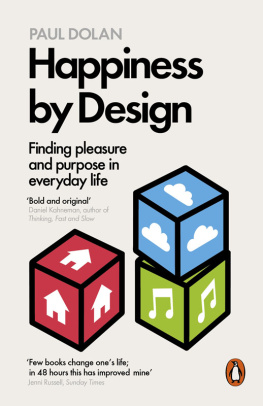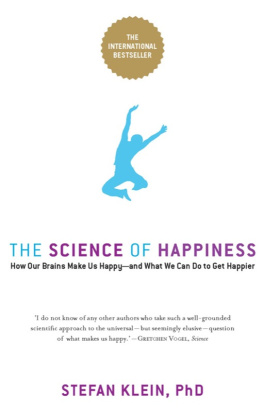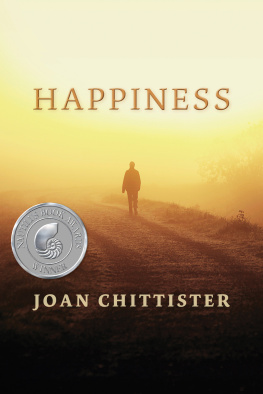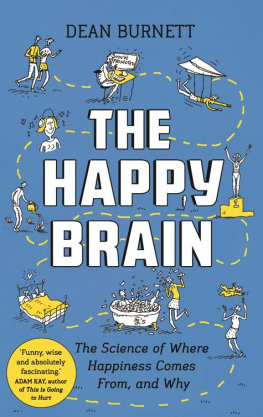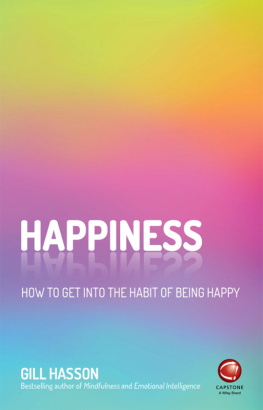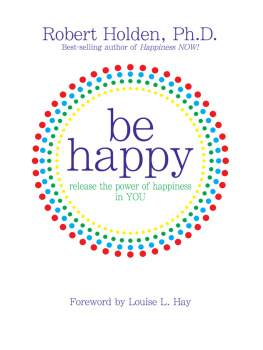Contents
Acknowledgments
This is the bit where I say how I couldnt have done it on my own. Thats actually not true because I could have written this book on my ownit just wouldnt have been very good. There are many people who have helped to make Happiness by Design a book that I am very proud of, and I hope they are proud to be associated with it. Here they are:
Main personal support: My wife, Les, who took the kids out many times so that I could get on with writing. Among her many qualities, she keeps my feet firmly on the ground and she makes me laugh.
Main intellectual inspiration: Danny Kahneman, who is simply the smartest and nicest man I have ever met.
Researcher extraordinaire: Laura Kudrna, who was always on the other end of the phone or e-mail to listen to my ramblings, to help make them more coherent, and then find research evidence that supported (and often disproved) them. She was also responsible for all the analysis of new data on pleasure and purpose reported in . Her ability to work (almost) as intensely and thoroughly as me in the final stages was remarkable.
Invaluable research support: Liz Plank, who was with me from the beginning and who found so many interesting studies that acted as a catalyst for many of my ideas, and Kate Laffan, who turned around the analysis of the ONS data in record time.
Additional research support: Daniel Davis and Merata Snedden in the early days of this project.
Main academic collaborators, whose joint work with me informs much of what is in the book, and who also provided detailed comments: Rob Metcalfe, who has felt like my intellectual child since doing his PhD with me a few years ago, but who may well end up as more successful than his academic father (when I will no longer like him, of course); David Bradford, who is a brilliant economist and who reminds me that there is an economist still lurking in me somewhere; George Kavetsos and Matteo Galizzi, two very smart postdocs who are also two of the kindest people I have ever met; Grace Lordan and Caroline Rudisill, two of LSEs finest and most helpful lecturers; and Ivo Vlaev, who is sometimes on a different planet but has some great ideas when he is on this one.
Main comment providers: Miguel Llabres Hargreaves, my best friend; Dixie Deane, my best training partner; Paula Skidmore, who came up with some great ideas about the exercises; Daniel Fujiwara, who is a great PhD student and a wizard with happiness data; Dom King and Henry Lee, two surgeons whose PhDs I have had the honor to supervise; Lisa Witter, whose comments on an earlier draft led to significant improvements; Oliver Harrison, who provided some really insightful comments; Chloe Foy, who inspired some last-minute improvements; Steve Martin, who helped with the initial pitch; and Helen Coyle, who pointed me in the right direction to begin with.
Special agent: Thatll be Max Brockman, who helped me write the initial book proposal and get the deals, and who also remained calm every step of the way.
Editors with faith (in me): Christina Rodriguez and Alexis Kirschbaum, for supporting this project and for helping me present the material in a way that has a much better chance of resonating with you than if I had been left to my own devices.
Thank you all so very much. If you judge someone by the company they keep, then I am a truly wonderful personor very lucky (lucky it is, then). You have all helped with happiness by design but, much more than that, you continue to bring me considerable pleasure and purpose in everyday life.
1
What is happiness?
Your life goes well when you are happy. But what exactly is happiness? Im not asking what happiness is affected by, but what it actually is. The different ways in which we define happiness affect what we can do to improve it. So a clear definition should be, but rarely is, a fundamental concern for any book on happiness. Having worked at the interface of economics, psychology, philosophy, and policy for two decades, I think I am well placed to make a strong case for the following definition: happiness is experiences of pleasure and purpose over time. This definition is novel, its coherent, and it resonates with people in my research and in my life; and I hope it will with you, too. It is also measurable, which is vital if we are to advance our understanding of happiness. Now lets take a step back.
HAPPINESS AS EVALUATION
Happiness has not typically been measured in this experience-based way; rather, it has been assessed using evaluations of how well life is going overall. A personal anecdote illustrates the difference nicely. A few weeks ago, I went out for dinner with one of my best friends, whom I have known for a long time. She works for a prestigious media company and basically spent the whole evening describing how miserable she was at work; she variously moaned about her boss, her colleagues, and her commute. At the end of dinner, and without a hint of irony, she said, Of course, I love working at MediaLand.
There is actually no real contradiction here: she is experiencing her work in one way and evaluating it in another way. The distinction between experience and evaluation is rather like the difference between being filmed and having your photograph taken. My friend was describing the daily film of her job as miserable and the overall snapshot as quite satisfying in comparison.
We shall see that this is not only a common thing to do but its also a common mistake to make about our happiness. Many of the assumptions we make about happiness and about ourselves have a lot to do with the fact that we generally pay more attention to what we think should make us happy rather than focusing on what actually does. My friend is not happy at work but her experiences have less influence on her behavior than do her evaluations. She loves the idea of working at MediaLand and this is what she acts upon. As a result, she is less happy, day to day, than she could be.
Satisfaction with particular aspects of life, such as work, health, and relationships, will often predict what we dojust as my friends relatively positive evaluation of working at MediaLand means that she could stay putbut measures of satisfaction are still not very well placed to capture how we feel. My friend is pretty miserable at work, and we should be taking that into account when we measure her happiness.
Most happiness surveys ask rather vague and abstract questions like Overall, how satisfied are you with your life? as well as about satisfaction with particular aspects of life. Of course, one question can never really get at all the complex aspects of happiness, but single questions can help us to approximate what makes most people happy or unhappy. The real problem with this question, however, is that overall life satisfaction is rarely considered in our daily lives; perhaps it is only ever really triggered in studies that measure it.
This helps to explain why responses to life satisfaction questions seem to be affected by apparently irrelevant factors, such as whether or not you are asked about your political views before being asked a life satisfaction question, where the effect is nearly as large as becoming unemployed.
You pose in a particular way when you have your photograph taken. Think of all the times you have posed for the camera in ways that do not reflect your current feelings. A camcorder is much better at showing how happy you are over time. So we need to move away from global snapshots of overall life satisfaction and instead focus more directly on our day-to-day feelings.

